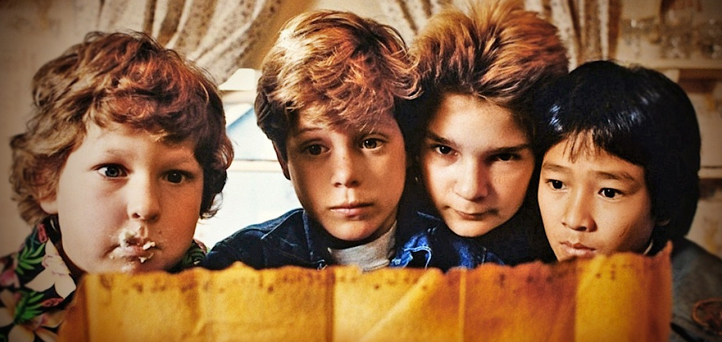The Goonies, Lost Treasure and Maritime Law

In The Goonies, would they really have been able to keep the jewels Mikey got off the pirate ship? Or would the State have asserted ownership of the discovered “historical relics”?
If you haven’t seen The Goonies, you should. It’s a classic 80s movie, and although it was directed by Richard Donner, the story was written by Stephen Spielberg, and the movie has his fingerprints all over it. The Blu-Ray edition came out a couple of years ago, and we can recommend it. For more nostalgia, check out the cast reunion video that Empire magazine put together.
Anyway, back to the question. Law and the Multiverse has written about lost property before, including treasure troves. In this case the issue is complicated by two facts: 1) the movie is set in Oregon, so we have to apply Oregon law and 2) the treasure is on a boat.
I. Oregon Law and Lost Property
As you might guess for a state high up on the west coast, there aren’t too many Oregon cases dealing with treasure (just what was a 17th century pirate doing in northwest Oregon anyway?). But there are enough to get some basic definitions.
In Oregon, a treasure trove is the property of the finder and consists of “[m]oney or coin, gold, silver, plate, or bullion found hidden in the earth or other private place, the owner thereof being unknown.” Bergeron v. Aero Sales, Inc., 134 P.3d 964, 969 (Or. Ct. App. 2006) (quoting Jackson v. Steinberg, 186 Or. 129 (1948)). “The treasure must have been hidden or concealed so long as to indicate that its owner, in all probability, is dead or unknown.” Jackson v. Steinberg, 186 Or. at 140.
Notably, “the ownership or possession of the land upon which [treasure trove or abandoned property] was found is immaterial.” Hill v. Schrunk, 292 P.2d 141, 142 (Or. 1956). “It seems to be the principle respecting treasure trove, owing to its peculiar nature of being coin, that the present property is in the finder, as against every one but the true owner, provided that the true owner is unknown, and it matters not where or when the same is found, so that it is secreted in the earth or other private place.” Jackson at 144 (quoting Ferguson v. Ray, 44 Or. 557 (1904)).

The Goonies’ Jewels
One-Eyed Willie’s ship (and thus the treasure) was hidden in an underground lagoon, which seems to count as both hidden in the earth and a private place. One-Eyed Willie is obviously dead, and I don’t recall any descendants being discussed in the movie, certainly not any known ones. And it doesn’t matter that the Goonies found the treasure on somebody else’s land. So the Goonies may have a legitimate claim to the jewels as part of a treasure trove.
II. Admiralty Law
Here’s where it gets sticky. If the treasure is considered a treasure trove, then the answer is easy enough. But the treasure wasn’t buried underground as such; it was on a boat floating on an underground lake. This means it might actually be a salvage operation, and salvage and treasure trove are mutually exclusive. Treasure Salvors, Inc. v. Unidentified Wrecked and Abandoned Sailing Vessel, 459 F. Supp. 507, 525 (S.D. Fla. 1978), aff’d, 621 F.2d 1340 (5th Cir. 1980), aff’d in part, rev’d in part on other grounds, 458 U.S. 670, (1982). So what is salvage, exactly?
“Salvage” is the compensation or reward allowed to persons by whose voluntary assistance to a ship at sea or its cargo, or both, have been saved in whole or in part from impending sea peril or by which such property has been recovered from actual peril or loss, as in cases of shipwreck, dereliction, or recapture.
Am. Jur. 2d Salvage § 1. Since the ship was still more-or-less seaworthy, this would seem to be a case of a derelict ship rather than a shipwreck. If the Goonies had actually engaged in a salvage operation then they would not have any right to the ship or its contents but rather only to receive a salvage award. That means no fair keeping the jewels, but the salvage award would be more than enough to compensate. The problem is that the boat went sailing off into the ocean, and getting a salvage award can take years. That’s cold comfort when the evil Astoria Country Club is breathing down your neck.
Hope is not yet lost, however. Salvage only applies to ships that have not been abandoned by their owners. Columbus–America Discovery v. Atlantic Mut. Ins., 974 F.2d 450, 459 (4th Cir.1992). When a ship has been abandoned, then a different law applies, the law of finds.

Willie’s ship, The Inferno
Under the law of finds, the finder gets the ship and its contents, not a salvage award. Helpfully for this case, abandonment can be inferred when neither the owner nor their heirs have attempted to reclaim the vessel for a considerable length of time. See, e.g., Marex Intern., Inc. v. Unidentified, Wrecked and Abandoned Vessel, 952 F.Supp. 825, 828-29 (S.D. Ga. 1997) (holding that a vessel sunk in 1840 was properly considered abandoned). Willie’s ship, The Inferno, is certainly old enough to qualify as abandoned, and again there are no signs of any heirs. Under the law of finds, the Goonies could sue to establish title to the ship and its contents. If no heirs showed up to contest it, it would be theirs.
Even under the law of finds there is a catch, however. The Inferno may be an historic shipwreck. If it is, then the court could impose an archaeological duty of care before handing over title. Marex, 952 F.Supp. at 829. The Goonies would also have to show some reasonable prospect of success at recovering the ship. Given the Goonies’ fairly cavalier approach to treasure hunting (and the fact that the movie ends with the ship floating out to sea), bringing in some professional archaeologists and recovery experts might not be a bad idea.
III. Conclusion
Whether the law of lost property or admiralty applies, the Goonies just might have a good claim to the treasure. The law of lost property would probably treat them better, however.



